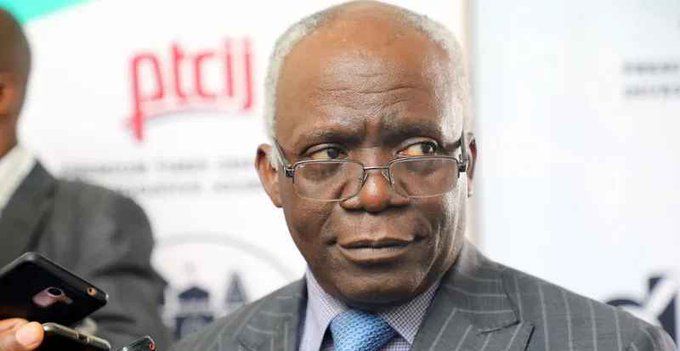Opinion
Femi Falana: Buhari’s Lockdown order cannot be enforced without Legal backing

Following the national broadcast of President Muhammadu Buhari on the COVID-19 pandemic on Sunday, some lawyers have questioned the constitutional validity of the restriction of locomotion of people in Abuja, Lagos and Ogun states. No doubt, the President is empowered to adopt any measures deemed fit to combat the dangerous disease but such measures have to be spelt out in a Regulation made pursuant to section 305 of the constitution or under the Quarantine Act. Otherwise the presidential order on restriction of movement in the affected areas cannot be enforced by the police.
Even though civil rule was restored in the country 21 years ago the psyche of the political class has not been demilitarised. Hence, decisions taken by rulers are required to be obeyed “with immediate effect” without any legal backing. But in Okafor v Governor of Lagos State (2016) LPELR-41066 (CA) the Court of Appeal called on all authorities to appreciate the need to govern the country under the rule of law. Thus, the directive of the Governor of Lagos State restricting the movement of citizens and residents during the state’s monthly environmental sanitation exercise was struck down because of its unconstitutionality. It was the unanimous view of their lordships that the arrest of appellant for flouting the order or directive of the governor was completely illegal. According to Georgewill , J.C.A.
“It is my view, that democracy thrives more on obeying and promoting the rule of law rather than the whims and caprices of the leaders against the lead. I find the conduct of the Respondent in not only persecuting the Appellant, yes that is what in my view it amounts to when a free citizen of this great country such as Citizen Faith Okafor, is put through the rigours of criminal process for an offence not prescribed in any written law but merely on the directive of the governor of the Lagos State. An action which if allowed to thrive in a democracy such as ours could confer on such office holders infinite, absolute and autocratic powers contrary to the clear provisions of the constitution of the land, to which both the leaders and the led are subject. I refuse to allow such autocratic, absolute and infinite powers to fester upon our nascent democracy.”
Lawyers who are saying that the law should be completely relegated to the background in combating the coronavirus pandemic reminds me of the dissenting judgment of Lord Atkins in the case of Liversidge v Anderson 1944 UKHL 1. While accusing his learned brethren of being “more executive minded than the executive”, his Lordship said inter alia:
“In England, amidst the clash of arms, the laws are not silent. They may be changed, but they speak the same language in war as in peace. It has always been one of the pillars of freedom, one of the principles of liberty for which on recent authority we are now fighting, that the judges are no respecters of persons, and stand between the subject and any attempted encroachments on his liberty by the executive, alert to see that any coercive action is justified in law.”
However. while the nation’s armed forces should be commended for making their medical facilities available to members of the public in the fight against the highly dangerous virus the plan to dispatch armed soldiers to the streets to enforce the COVID-19 guidelines should be shelved because it is illegal. For the umpteenth time, I am compelled to draw the attention of the military authorities to the case of Yussuf v Obasanjo (2005) 18 NWLR (Pt ) where Salami JCA (as he then was) held that “It is up to the police to protect our nascent democracy and not the military, otherwise the democracy might be wittingly or unwittingly militarized. This is not what the citizenry bargained for in wrestling power from the military in 1999. Conscious steps should be taken to civilianise the polity and thereby ensure the survival of and sustainance of democracy.”
In the same vein, in the celebrated case of All Progressive Congress v Peoples Democratic Party (2015) LPELR 24349 Aboki JCA held that the President lacks the power to call on the Armed Forces to restore law and order in any part of the federation without the approval of the National Assembly as provided in sections 217(2) and 218(4) of the constitution as amended. His Lordship reminded the Federal Government of its legal obligation “to confine the military to their demanding assignments especially in these trying times of insurgencies and encroachment into the country’s territories…”
Finally, just last week the satanic Boko Haram force was reported to have massacred 47 Nigerian troops and 92 Chadian soldiers in two separate attacks. In view of such enormous challenge our patriotic armed forces should concentrate efforts on the counter insurgency operations being carried out in the north east region while the police and allied security agencies are allowed to enforce the COVID-19 regulations and guidelines.






